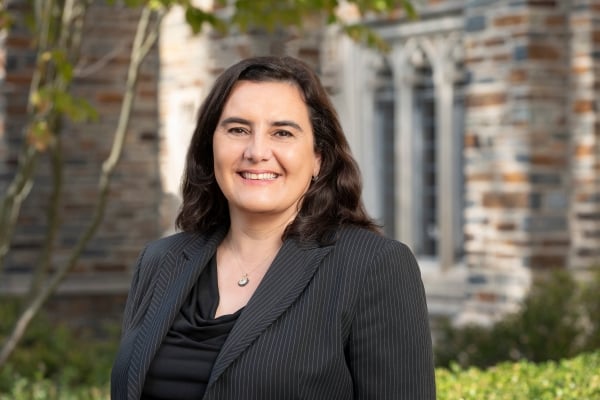
In our book Learning Innovation and the Future of Higher Education, we profile Duke’s learning innovation unit. That organization is now called Duke Learning Innovation & Lifetime Education and is headed by higher education superstar Yakut Gazi. Yakut graciously agreed to answer our questions about her work at Duke, her career and her advice for those aspiring to leadership roles in the academic innovation space.

Q: Tell us about Learning Innovation and Lifetime Education. What does the organization do? And why is it important for those of us outside of Duke to understand the structure, role and culture of the organization?
A: Since being highlighted in your book, Duke has established a vice provost for learning innovation and digital education, and I am honored to have been selected for this inaugural leadership role. This vice provostial position is a signal that this is now a top-level strategic area that will propel the institution forward, building upon past successes. Under my leadership, the Learning Innovation and Continuing Studies units have merged to form Duke Learning Innovation and Lifetime Education. Together, we bring innovative, evidence-based teaching practices and learning opportunities to Duke’s faculty and community of learners across a wide variety of ages, backgrounds and geographies. Our goal is to position Duke as a powerhouse for learning innovation and lifetime education.
Our new structure views education as a lifelong endeavor that is neither marginal nor siloed but rather an integrated activity central to the university’s mission and to every stage of life. Our organization is connected to and supports all five presidential priorities of Duke. As a top-10 research-intensive institution, our approach is centered on research-driven educational consulting and market-driven lifetime learning opportunities that serve all learners, from precollege to postcareer.
For example, last year, we held our inaugural Emerging Pedagogies Summit as a platform to bring together ideas, technologies and people—and this October we’re inviting all educators, from any campus, to join us for these discussions about how we can all do more. This fall we are launching a major new research initiative—stay tuned for big news coming out of Duke. And within our lifetime education portfolio, we are investing in market-driven insights for program development, an important departure from traditional supply-based program creation.
Q: Throughout your career, you have been a champion of premier universities leveraging online and digital modalities to enhance access to higher education. You are perhaps best known for your work on scaled, low-cost ,high-quality degrees at your previous university, Georgia Tech. Where does your current leadership role at Duke fit into that broader movement to bend the higher education cost curve?
A: This world needs more people to be touched by institutions like Harvard, Stanford and Duke. Institutions like ours not only have the resources and capacity but also a global social responsibility to expand access to learning opportunities and create impact at scale. We need to move beyond the selectivity notions of the past and recognize them for what they are: capacity problems. We now have successful examples of affordable and accessible educational programs from highly selective institutions that have solved these capacity issues through innovative educational delivery and financial/business models. So why do we still cling to outdated notions about how people learn and limit our impact to our relatively small campuses?
At Duke, I am committed to building upon the institution’s long and established history of micro-innovations and transforming them into mezzo innovations that will revolutionize teaching and learning at elite institutions. This represents a significant cultural shift both within and outside of my unit. I see this as the crowning challenge of my career. Duke is the ideal place to achieve this, and the team we are building has what it takes.
Q: What advice do you have for someone looking to build their career towards a leadership role in an academic innovation unit? What experiences, skills, roles, networks and communities should they invest in and nurture? From your own career arc, what advice do you have for others looking to follow a similar path to leadership?
A: When I was pursuing my Ph.D. a quarter century ago, my fellow graduate students in engineering and science often teased me, saying, “How does one do a Ph.D. in educational technology? You bring an overhead projector to the classroom and there you have it.” Look at where we are now with ed tech and academic innovation! Academic innovation units proved to be absolutely critical during the pandemic as well. What we do is exciting and impactful work. We are riding the wave!
Having said this, we are on the cusp of major changes in our schools and societies, especially given the technological advances of our time. We are in an interesting position to both help educators prepare students for this future as well as prepare ourselves for this future. No one in our field should be operating solo. If you are not connected to others and professional organizations, you will not be able to learn, keep up with the pace of change and upgrade yourself to remain relevant in the workforce. We all need to be entrepreneurs of our careers. There are always opportunities for growth, even if that growth is not where you currently are. To borrow an Apple motto, we need to be “relentlessly restless” to be successful and, more importantly, to make an impact on the world.